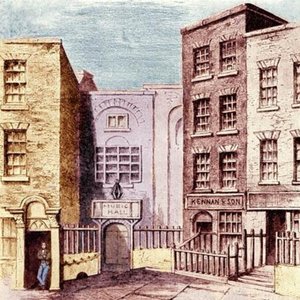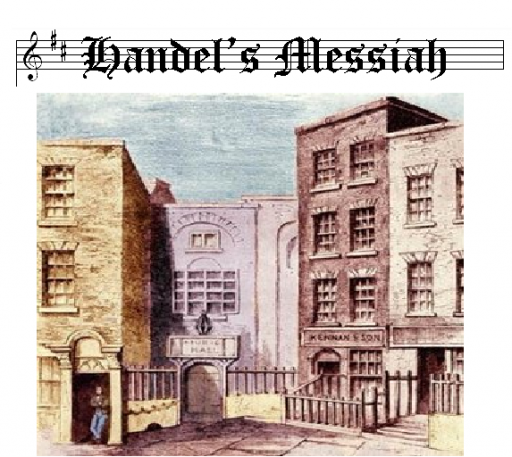
Although George Frideric Handel (1685-1759) was born in Germany he is associated with Fishamble Street in Dublin as this was the venue for the first performance of his most famous work, “The Messiah”. Handel was a very prodigious and highly regarded composer. In 1824 Ludwig von Beethoven stated that “Handel is the greatest composer who ever lived. I would bare my head and kneel at his grave”.
The “Messiah” is regarded as one of the great classical pieces of Christmas music. It is a celebration of both Christmas and Easter. The first section begins with the Nativity and continues with the story of the Crucifixion and the Redemption in the second part. The third section is an affirmation of faith.
The most famous part is the “Hallelujah Chorus” which is from the second part, yet it is more readily associated with Christmas.
This oratorio was completed in just twenty-four days, which was an incredibly short time to write a three-hour masterpiece and especially since he was paralysed on his left side following a stroke. When he received Charles Jennens’ libretto (the text of the opera), he decided Handel was inspired to prepare it for a benefit performance to aid three Dublin charities in order to fulfil a request received a few months earlier.
Handel began writing his masterpiece on 22 August 1741. He shut himself into his room for three weeks with little time devoted to anything else. On one occasion a servant discovered him weeping at the desk. He had just completed the “Hallelujah Chorus, and said, “I did think I did see all Heaven before me, and the great God Himself.”

Drawing by F.W. Fairhold (1814-1866).
The first-ever performance was on 13 April 1742 in Neal’s Music Hall on Fishamble Street Dublin, to instant acclaim.
The performance had a big influence on the Dublin fashion scene. The initial performance was so packed that the ladies were asked to leave the hoop from their skirts at home and the gentlemen were asked not to bring their swords so that the hall could fit in even more people! This began the fashion of a hoop-less slimmer look in public.
According to the Smithsonian Magazine “The audience swelled to a record 700, as ladies had heeded pleas by management to wear dresses “without Hoops” in order to make “Room for more company.” Handel’s superstar status was not the only draw; many also came to glimpse the contralto, Susannah Cibber, then embroiled in a scandalous divorce.“
Geoarge Faulkners Dublin Journal reporting on the concert noted:
“On Tuesday last, Mr. Handel’s sacred grand oratorio, The Messiah, was performed in the New Music Hall in Fishamble-street ; the best judges allowed it to be the most finished piece of music. Words are wanting to express the exquisite delight it afforded to the admiring crowded audience. The sublime, the grand, and the tender, adapted to the most elevated, majestic, and moving words, conspired to transport and charm the ravished heart and ear. It is but justice to Mr. Handel, that the world should know he generously gave the money arising- from this grand performance to be equally shared by the Society for Relieving Prisoners, the Charitable Infirmary, and Mercers Hospital, for which they will ever gratefully remember his name”.
The tradition of standing during the “Hallelujah Chorus” did not begin in Dublin, however. The following year, during a performance in London, King George II, was so moved by the inspiration of the piece, he stood up. Naturally, when the King stands, everyone else must also get up and this was the start of the custom which persists until the present day.
Some days after this London performance, Handel visited a patron Lord Kinnoul who congratulated him on “the noble entertainment”. Handel is said to have remarked, some days after this London performance, “My Lord, I should be sorry if I only entertained them; I wished to make them better.”
George Fredrick Handel“My Lord, I should be sorry if I only entertained them; I wished to make them better.”
Handel died on April 14, 1759, in London and was buried in Westminster Abbey with full state honours.
You can watch a performance of Handel’s Messiah here:
